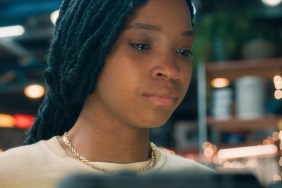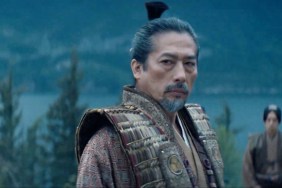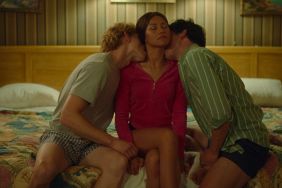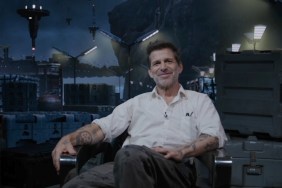Responsible for some of the most intense horror films of the late ’70s and ’80s, director David Cronenberg transitioned into the world of crime with his two most recent films A History of Violence and Eastern Promises. Four years since the latter, Cronenberg is back doing something quite unexpected as he delivers a period drama, A Dangerous Method, based on the Christopher Hampton play “The Talking Cure.”
It stars man-of-the-year Michael Fassbender as famed psychotherapist Dr. Carl Jung who finally has a chance to meet his mentor Sigmund Freud, played by Cronenberg’s frequent collaborator Viggo Mortensen. What eventually puts a wedge in the friendship is Keira Knightley’s Sabina Spielrein, a former patient of Jung’s who has an affair with him once he takes on the role of mentor when she decides to get into therapy herself, with Freud caught in the middle when things go sour.
While a complex historical relationship like this may not seem like Cronenberg’s thing, Sabina’s condition is reflective of her masochistic tendencies arising from her being beaten as girl by her father, something that allows Cronenberg to explore some of the sexual taboos that have been prominent in much of his work. It’s a lovely film that isn’t nearly as edgy or dark as Cronenberg’s other work, but shows that he’s capable of doing a period piece with the best of them.
ComingSoon.net spoke with the director a few months back while he was doing the festival rounds which brought him to New York City to show his new movie at the New York Film Festival. We also talked briefly about his return to writing with Cosmopolis, his adaptation of Don DeLillo’s novel starring Robert Pattinson, Jay Baruchel and Paul Giamatti.
ComingSoon.net: I know this was a play by Christopher Hampton…
David Cronenberg: You know, it was a script first. He wrote it for Julia Roberts. It was called “Sabina.” It was at Fox. That was maybe, I don’t know, 15 or 17 years ago. Then he asked them if it would be okay if he made a play out of it when the movie didn’t happen, so ironically enough, it was a screenplay before it was a play. When we started to talk about making a movie out of it, we had the old screenplay to work with plus his play plus new research and so on, so it was an amalgam of all those.
CS: How long ago was that? Because around the time of “Atonement,” he was talking about this but I don’t think he mentioned your name.
Cronenberg: I’m very bad with time actually, but I did call him at some point and say, “I’d really be interested in making a movie out of this.” He was interested, and then I think at a certain point he was thinking maybe he would want to direct it. It just went on and on for a while so I dropped it. I said, “Well, call me if you ever were interested in having me do this.” At a certain point, he did call me, said, “You know, I think I would like you to try and make a movie out of this, so that took some years, really.
CS: That’s right. I do remember him mentioning that that was something he wanted to direct. What was your first interaction with him about this? Had you seen the play?
Cronenberg: I had never seen the play. I was intrigued because of course Ralph (Fiennes) was in it. I had worked with him on “Spider” and I read the play. I looked at stills from the play online and stuff, but I actually had never seen the play. I think when I read it, basically I started to realize that maybe I’d always wanted to do something about Freud and the birth of psychoanalysis. But to say that is not to say much because it’s such a huge subject. Suddenly, here was this wonderful structure, the kind that you need to make a movie, very concise. Christopher had brilliantly distilled down this incredible cast of characters, if you’re talking about psychoanalysis, all of them incredibly eccentric and brilliant and all of that. He basically distilled it down to about five characters including Otto Gross and Emma Jung. I had never heard of Sabina before, so this was my introduction to Sabina, and that was really very intriguing. So that’s basically it. I mean, it unleashed my desire to resurrect Freud. I had no political agenda one way or another vis a vis Freud, Jung, Sabina; I just wanted them to come back to life, you know? (Laughs) And let you see them and hear them. Fortunately, Christopher had done huge research, and then we did more. It was an era of very detailed, obsessive letter writing, so we had great resources to know what they thought, what they actually said. They would record conversations. In Vienna, there were at that time somewhere between five and eight mail deliveries every day, so if you sent a letter in the morning, you expected a letter to come back to you by the afternoon.

CS: Really? Wow.
Cronenberg: Yeah, we think the internet is so hot, but actually, before they had the internet, it was letter writing, so there are volumes and volumes of letters amongst all of these people in great detail, and not only just saying what they thought, but what they said, what they wore, what they ate, what they dreamed because these were – as you can imagine considering the shape of psychoanalysis, they were obsessive about details and the meaning of those details. So we had tons of stuff to go by, so I would say that given the compression that’s necessary to combine that many years into just short of 100 minutes, it’s pretty accurate in terms of these characters and what they did and said.
CS: What’s interesting to me about this movie is that it’s one of your first historical pieces. I feel you’ve done a few period movies, but this really is the first one about known people in history.
Cronenberg: Yeah, I’d say so, yeah, yeah. I mean, fictionalized versions of “M. Butterfly” and “Dead Ringers.” Those were based on real people and real histories.
CS: But you ended up doing a lot of the research into these times yourself?
Cronenberg: You do research yourself. I mean, first of all, just as a matter of course, I certainly wanted to read widely, and that’s one of the joys of doing a movie like this, is it forces you to do research and to read deeply, and not just read, but I mean, you can see interviews with Carl Jung on YouTube because he died in 1961, so there’s tons of interviews with him.
CS: Wow, I didn’t know that either.
Cronenberg: Yeah, of course he’s in his 70s and so on. There’s some footage of Freud, and that’s all very valuable for someone like Viggo to see how Freud moved and walked. There’s really only one voice recording of Freud, and that happened when he was in London in the last year of his life. So, but that’s still fascinating to at least hear his voice. But Jung, there’s much more because he lived in a different era. Yeah, so I got into all of that. Then I talked to Christopher about it because there’s some things that I might question and say, “Why have you got him saying this? Are there documents to support this or not?” Sometimes not, and then – it’s all very intriguing, and for me, it’s part of the fun.
CS: All three of your main cast are great dramatic actors who we’ve seen give strong performances. What’s interesting is how Keira portrays Sabina, which is very distinctive, so did you talk a lot about how she should be portrayed?
Cronenberg: Well, she did talk to Christopher because she knew him, and he gave her a stack of books to read, but we also talked about, for example, Christopher has actually seen, in the University of Geneva, the analysis of Jung, his writings about Sabina’s symptoms, the first day that she was brought to him. So we have a great detail of what her symptoms were. Then, also there’s a ton of literature about hysteria, which was a disease that really has sort of disappeared as a disease now, but came out of the social context and considered to be a disease of women particularly. There’s actually film footage of hysterical patients, so Keira and I, we discussed in detail how far we would go with those opening scenes. I know some people think that they’re extreme, but in fact, they’re very subdued compared with what these patients really did. I mean, they were really acting out, in a way. It was sort of psychological theater for them. These women were trying to express things that they were not allowed to express if they were proper women, but if they were patients of hysteria, then they could express these things. So basically I said to Keira, “Really, this woman is trying to speak the unspeakable and she’s trying to say things that are hideous and repellant to her even to think, but she’s been encouraged to speak them, after all, it’s a talking cure.” I thought that most of her symptoms should be around the mouth and the difficulty of getting the words out, so that was our basic approach to her.
CS: At what point did you change the title to “A Dangerous Method”?
Cronenberg: Yeah, I loved the title “The Talking Cure” for a play. I didn’t think it was a good movie title, and I think “talking,” boring, cure, disease. For a novel or a play, I think it’s different. You have to decide what your audience is, and in fact, they’ve even changed the title in Germany. They’re calling it “Dark Desire” or something like that.

CS: Your movies over the years must have some really interesting foreign titles.
Cronenberg: They do, they do. It’s often I don’t even hear about it until many years later. So it’s really shaping the title for the audience that you feel you might get. Of course, one of the sources of our research was a book called “The Most Dangerous Method.” Now, that book, which it’s title is a quote from William James, the American psychologist who was the brother of Henry James, the novelist. He said when Freud came to America–as we show in the movie, but we don’t show the lectures and so on–but he went to those lectures, and he said that this dream analysis of Freud’s is a most dangerous method, he said. That was where our title came from.
CS: I also like the character of Otto Gross. Again, you haven’t seen the play, so I don’t know if you had any kind of comparison, but it didn’t seem like that character would be in the play.
Cronenberg: Yes, I don’t even remember if he was in the play or not, but certainly he was in the screenplay. Otto was a crucial character because he is sort of the dark angel speaking to Jung, but once again, totally accurate. I mean, he was a proto-hippie. He was a guy who would’ve fit in the ’60s in America perfectly because he believed in free love. He lived on a commune. He believed in not eating meat. He believed in taking drugs and he believed that marriage was a doomed institution and that bad things. He had no qualms about sleeping with his patients. He was sort of a free spirit in the hippie style.
CS: He was a real person as well?
Cronenberg: Absolutely, he’s absolutely a real person, yeah.
CS: I loved how Vincent Cassell seems to have joined your ensemble of actors you work with.
Cronenberg: Yeah, well, it’s only the second time for Vincent, but we do like each other. We do get along really well, and the strange thing is, is he looks a lot like Otto Gross. There are only a couple of pictures of Otto Gross, but he actually looks like him, yeah.
CS: There’s something kind of interesting in the zeitgeist. You said that when you wrote this, you were interested by the screenplay but there are a lot of plays being made into movies right now. “The Ides of March” is based on a play, so is “Carnage.”
Cronenberg: Well, I think, yeah, that’s common. I mean, that was in the beginning of cinema, that was the mix specifically between theater and movies because it was very tight. But movies can come from anywhere, and it’s just people are desperate to find interesting material. Often, a remake of an old movie is not the most interesting material, not necessarily, so it doesn’t surprise me. Also, if you’re asking me about the reality of it, I think there are a lot of executives who don’t know how to read a script. I mean, they really can’t imagine the movie from the script, so if you have a play that they can go to and they see it or a graphic novel or a comic book or an old movie that they can watch, then they don’t have to have that sort of literary imagination. (laughs) I mean, it’s kind of a real skill to read a screenplay because it’s a very odd kind of writing. It’s not like writing a novel or anything like that. The literary style doesn’t really matter, so it’s sometimes very difficult for producers and executives to really see the movie from just a script.
CS: It seems very true nowadays especially.
Cronenberg: It is, yeah, because a lot of executives come from business. They don’t come from theater or they don’t come from the dramatic arts, and therefore, they need a little help, let’s put it that way.
CS: Let’s talk about “Cosmopolis.” I think it’s terrific you’re writing again, and I loved a lot of the other movies you’ve written but you’ve gotten away from that, so was “Cosmopolis” something you’d been writing for a long time?
Cronenberg: No, no, “Cosmopolis” is based on a novel. It took me six days to write it. Yeah, but that’s because the novel is so great, and the dialogue in it is incredible. It’s very cinematic. Well, it is and it isn’t. Most of the movie takes place inside a limo, so some people would say that’s not cinematic, but I say it is. So, yeah, writing is interesting. I know guys like De Palma used to write their screenplays, and the thing is that when you’re starting out, your screenplay is the hook that gets you into directing. It certainly was for me because screenplays are harder to find than the directors, actually. A good screenplay is harder to find than a good director. (laughs) Writing your own screenplay was a way to get to direct. Then afterwards, there’s a sort of momentum to your career and you’re finishing a movie and to write a good screenplay – I wrote “Cosmopolis” in six days, but it was an adaptation. But to write an original screenplay, for example, is very difficult. It could easily take you a year or a couple of years, so once you’ve got a bit of a momentum as a director, can you really afford to just stop for two years to write a screenplay that you might not get made? So, it’s very tempting then when somebody says, “Look, we’ve got this screenplay. It’s terrific. It’s financed. We want you to direct it.” It’s very hard to say no, you know?

CS: I remember Guy Ritchie was one of those directors who always wrote his own material, but then he found opportunities to direct other things so he set writing asides.
Cronenberg: That’s exactly right. The thing is, to write, especially an original screenplay, means you really gotta stop for a couple of years doing anything else and just do that. It’s hard to do.
CS: I also want to ask about your relationship with the studio system, because you used to be very much a part of it but then you’ve drifted away in recent years.
Cronenberg: Well, I’ve never really done a studio movie, though. This is the thing. I mean, I guess “History of Violence” was the closest because it was an in-house New Line, and it depends whether you think of New Line as a studio or not, or as an independent production house, at the time. Of course, it’s disappearing really in a way now. For example, “The Dead Zone” was Dino De Laurentiis for Paramount. It wasn’t directly a Paramount movie, and the same, “M. Butterfly” was David Geffen Productions for Warner Brothers, but it wasn’t – so I’d dealt with studio executives and some of the studio structure. “The Fly” was Mel Brooks Films for Fox, but I had a production entity between me and the studio, so I’ve never – except for, as I say, “History of Violence”…
CS: In this case, you made the whole movie and then Sony Classics decided to distribute it.
Cronenberg: Well, you see, that’s what’s happened is why it’s so difficult right now is because there are very few places in America that you can get a pre-sale, in fact, probably none basically. You have to make the movie, and then try and sell it in America. Sometime back, there were a lot of places; Warner Independent existed, a lot of places that have been shuttered since, you could pre-sale all over the world, including America, and you would get an American sale before you made the movie. They wouldn’t read the script. They would say, “Hm, if you get this actor or this actor, we’re interested in buying the rights before you make the movie.” Not now. Now, it’s like, “Somehow finance the movie without America, and then, if we like it, maybe you’ll get a sale in America.” That’s a scary thing because you can definitely make a movie that’s relatively expensive and have no distribution in America, which is not good. So it’s quite perilous and difficult to make an independent film now, and certainly “Cosmopolis” was made that way and so was “Dangerous Method.” They were both about the same budget, and they were financed basically the same way, with all sort of pre-sales, Canada co-production with Telefilm money. That’s something that I can help make happen. 15 entities stitched together in a kind of Frankenstein quilt of financing. Some of them are private people, some of them are government entities in Germany and France and some of them are pre-sales. They all need to be signed at exactly the same moment. I mean, it was really difficult, and if one drops out, the whole thing can fall apart, so it’s actually very difficult to make movies that way. However, the good part is that you then are just making the movie with – like, it’s me and Jeremy Thomas, for example, for “A Dangerous Method.” As Jeremy and I often said, it was just us. We don’t have to answer to anybody else. We don’t have studio notes. We don’t have executives fighting each other and using our movie as a pawn in their own political game. We don’t have any of that to deal with. We just worry about making a good movie. So that’s the reward for all the agony of putting this creature together is that once you’re doing it, you’re just making the movie.
CS: That ties back into what you said before about they need to see something.
Cronenberg: That’s right. Yeah, well, I think it’s true.
CS: I’m curious about some of these other projects your name has been floating around in the time since “Eastern Promises,” including doing a remake of “Timecrimes.” There’s also been talk of a remake of “The Fly”, which I think you mentioned before.
Cronenberg: Yeah, “Timecrimes” was never – I mean, that was a strange thing, but that’s what happens. I mean, they proposed it to me, and I said, “No.” Then, suddenly it was on the net like I’m doing it. It was, I think the producer was so excited that I would meet and look at their original movie, that he started to talk about it like it’s happening. Actually, I think it was the director of the Spanish version was responsible for saying I’m doing it, but I was never doing it, you know?
CS: It’s just the way these things get escalated.
Cronenberg: Absolutely, and sometimes on IMDb you see you’re doing three movies you’ve never even heard of. They try to be accurate, but the ‘net is so intense and so instantaneous, and the sources are not checked. But whereas “The Fly,” it’s not exactly a remake as a sort of a sequel kinda. Yeah, that was a thing. I had written a script of that and I don’t know that that’s going to really happen, but that has to do with Fox anyway.
CS: What about “Eastern Promises” and doing more with those characters?
Cronenberg: That is also possible. Steve and I wrote an “Eastern Promises 2.” He’s writing a second draft of that. Focus are interested in it and we’ll see. I don’t know.
A Dangerous Method opens on Wednesday, November 23 in New York and Los Angeles.









